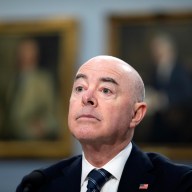Kevin MacDonald directed “Last King of Scotland,” so when the award-winning director turns his attention to a Bob Marley documentary, it’s obviously going to go way beyond the “every little thing’s gonna be all right” aspect of the late reggae legend.
“When I saw other things done on him in the past and read other books, I never felt like I knew him as a person,” says the director. “The aim is to see him as a man, what was he like as a lover, as a friend.”
While he was alive, Bob Marley didn’t do that many on-camera interviews though, so MacDonald had to uncover other sources, which included Marley’s teacher, his half-sister and a childhood friend.
“The main challenge of the film was getting the people to talk,” says MacDonald. “About a third of them have never spoke before.”
MacDonald also provides an honest look at Marley’s family life — he had at least 13 children from eight different women — and daughter Cedella speaks frankly about how the communal living situation at the singer’s house deprived her of important time with her father.
“She felt that sense that he was always surrounded by the brethren,” says MacDonald. “It was a religious order, almost a military setup. He was called ‘Skipper,’ and he ran a very tight ship. He was strict with [his musicians], he made them rehearse a lot. [Many people have an] image of Rastas that they lazed around smoking ganja all day, but in fact he was this driven guy.”
MacDonald says his international experience helped reinforce his notion that it was time somebody re-examined the life of Bob Marley on film.
“When I was making ‘The Last King of Scotland’ — I made that in Uganda and I was amazed by how in the slums of Uganda, you’d come across huge lots of Rastas singing Bob’s music, playing Bob’s music, doing murals of his face, graffiti of his lyrics, I was just realizing how Bob still speaks to people. … In Tibet, Indonesia, not just an audience which is college stoners or Western people who chill out and love the vibe of it. It’s also music that has a message that continues to appeal to people around the developing world. And that’s the key about understanding Bob; he’s the only Third World superstar. He didn’t come from North America or Europe, he came from abject poverty, he grew up in a shack in the hills of Jamaica sleeping on an earth floor. … So you go to go to Indonesia, people have never heard of the Rolling Stones, but they’ve all heard of Bob Marley. In Nigeria, they’ve got streets and squares named after him.”














